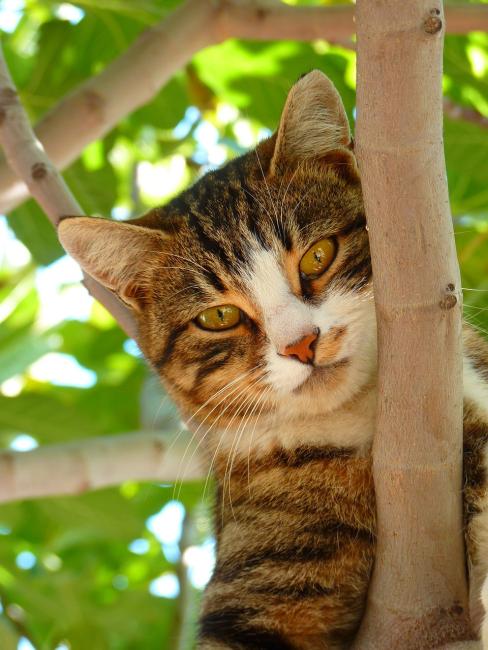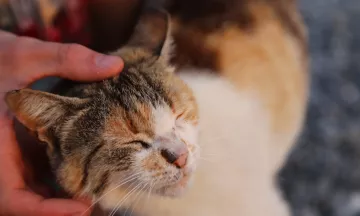A while ago we asked via Facebook whether your cat is an indoor or an outdoor cat and the reasons why. Your replies varied widely, which is hardly surprising, because there are just many arguments both for keeping your cat inside and for allowing him outside. So what's best: an indoor or an outdoor cat?
The outdoor cat: free and full of adventure
An outdoor moggy can give free reign to his natural instincts. Your cat is a hunter at heart, who enjoys chasing birds and insects. And he loves nothing more than giving you his freshly caught prey as a 'gift'... In addition, a large outdoor playground provides plenty of opportunity for climbing, eating, guarding territory, and sharpening claws. Cats that are allowed to roam outside can fully indulge in typical feline behaviour they get plenty of exercise and are generally content. Some cats, however, are so adventurous that they rarely come home, which kind of defeats the purpose of having a pet in the first place! There are also risks. Once outside, cats are exposed to a number of dangers, including traffic, accidental poisoning, fights and unwanted parenthood, and they can even go missing. Older cats or cats with allergies or injuries are at particular risk.

Keeping your outdoor cat safe
Fortunately, you can reduce the risks associated with the 'dangerous outdoors' by microchipping your cat, worming him regularly and making sure that his vaccinations are up to date. Have your cat neutered too. That way male cats won't wander off in search of a love interest, and female cats won't have an unplanned litter. Keep your cat in at night and provide him with a high visibility, fluorescent collar that bears his name and your phone number. Live on a busy road and are worried about traffic accidents? Then why not make a cat run? Simply fence off and cover a section of your garden using cat mesh, and your furry friend will be able to enjoy the great outdoors safely.
The indoor cat: cosy and companionable
Indoor cats might not get to experience the joys of outdoor living, but they can still lead extremely fulfilling lives. They are less likely to suffer from parasites or contagious diseases, and will thankfully never know the dangers of traffic. Another benefit is that they can't do their 'business' in other people's gardens (which keeps the neighbours happy ;-)) and they won't come home with any unwelcome prey, such as mice. Indoor cats are often more companionable too: they love snuggling on your lap and you get to enjoy much more of each other's company. Yet there are also risks associated with keeping your cat indoors. They cannot satisfy their hunting instincts for example, and they have fewer opportunities to exercise. This means that they may become bored and take it out on your furniture. There's little 'neutral territory' in the house either, which can create tension and lead to fights with other pets or even children and visitors. Indoor cats that are bored sometimes develop psychological or behavioural problems and are much more likely to become overweight. You also have to watch out for open windows, poisonous plants and dangerous cables, and make sure that medications are kept out of reach. So, as you can see, there are plenty of 'dangers' associated with indoor living too. Happily you can do something about them!

Keeping your indoor cat healthy
Indoor cats don't have access to a limitless outdoor playground. So provide them with plenty of distractions and opportunity for play. At a minimum, make sure your indoor cat has a scratching post, plenty of toys and lots of other fun play equipment, such as a cat tunnel. Cat toys needn't be expensive either! Use old cardboard boxes and hang climbing shelves on your walls, in order to create a fun indoor playground for your furry friend. Indulge your cat's hunting instincts by encouraging him to chase after cat wands or tease him with a laser pointer. If you want to make your cat truly happy, then consider getting him a brother or sister as a playmate: that way they can run around together and spend time grooming each other. Don't forget to seal open windows with gauze to prevent your cat from escaping or falling out, and store dangerous electronics and medicines safely out of reach. And remove any poisonous houseplants and replace them with lovely fresh cat grass instead. Last but not least: Provide a large litter box (or several - at least one for each cat), and make sure you clean and refresh it regularly. Moggies are extremely particular about their toilets!
Should you opt for an indoor or an outdoor cat?
Cats that are already accustomed to going outside, shouldn't be kept in later in life; this would really limit their freedom. Cats that have been kept inside from an early age on the other hand, can continue to live indoors, provided they're given sufficient distraction and exercise. So consider the needs of your cat carefully and make sure that he suits your current situation. If your house is a safe environment, you don't mind a little wear and tear on your furniture and you can provide your cat with plenty of entertainment, then he can live a perfectly fulfilling life inside. Conversely: if you limit the risks, your cat can also enjoy a fun and adventure-packed life in the great outdoors.
Is your cat an indoor or an outdoor cat? Why exactly? Share your thoughts by leaving your comment below!







